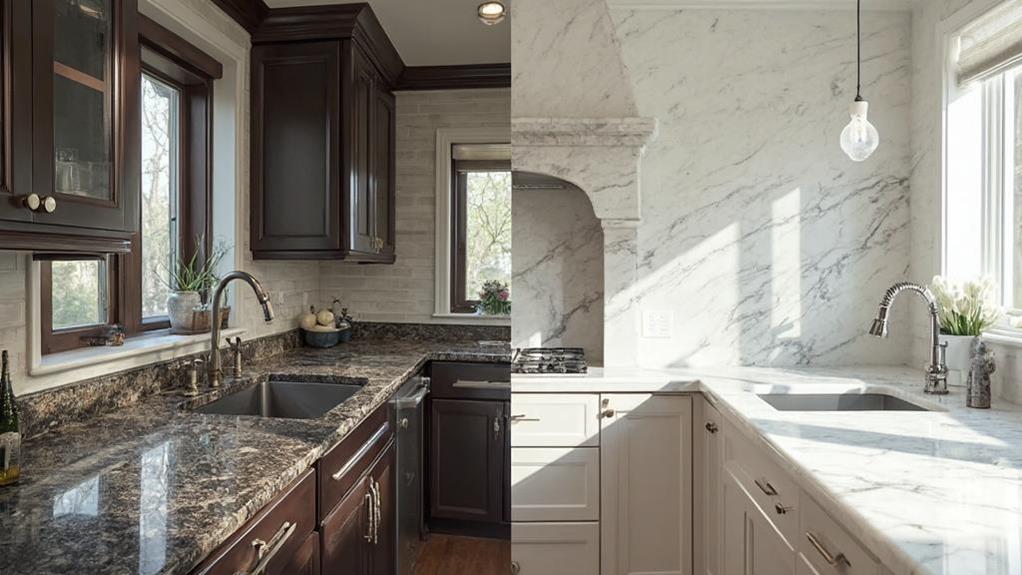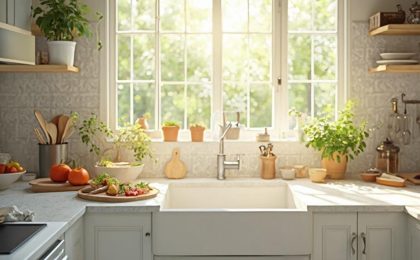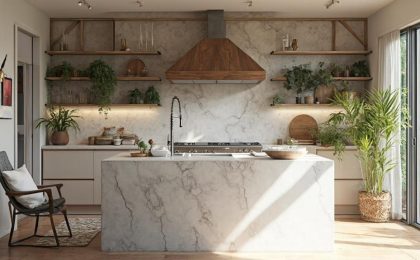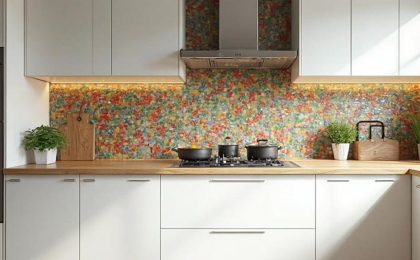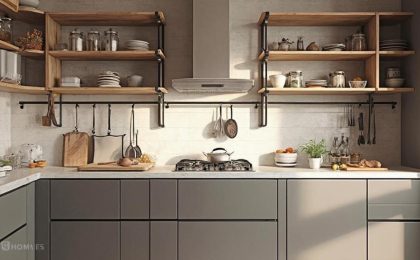When you’re choosing between granite and quartz countertops, it’s essential to evaluate the pros and cons of each material. Granite brings a unique, natural beauty and impressive heat resistance, but it demands regular maintenance. On the other hand, quartz offers a low-maintenance alternative that resists stains, yet it can be more vulnerable to extreme heat. So, how do you decide which fits your lifestyle and design vision best? Understanding the key differences and your specific needs can help you make a more informed choice. Let’s explore what each option truly brings to the table.
Key insights
- Granite offers unique natural beauty and heat resistance, but requires regular sealing and maintenance.
- Quartz combines aesthetic appeal with low maintenance, being non-porous and stain-resistant, but sensitive to extreme heat.
- Both materials provide durability, but granite can chip under impact while quartz resists scratches better.
- Cost-wise, granite ranges from $40 to $200 per square foot, while quartz typically ranges from $50 to $100 per square foot.
- Lifestyle and kitchen usage should guide your choice, balancing aesthetic preferences with practical considerations like maintenance and durability.
Overview of Granite Countertops
When you think of elegance and durability in kitchen design, granite countertops often come to mind. Their natural beauty, marked by unique patterns and rich colors, transforms any space into a sophisticated haven.
Granite isn’t just visually stunning; it’s also incredibly resilient, resistant to scratches and heat, making it a practical choice for busy kitchens. Hiring professional kitchen fitters guarantees that your installation is handled with expertise, enhancing both the aesthetic and functionality of your kitchen.
If you’re considering installation, remember that granite is heavy and requires proper support. It’s crucial to have a professional installation team to make certain it’s set up securely and correctly.
Take note of your kitchen layout; planning for seams and overhangs can enhance both functionality and aesthetics.
Once your granite countertops are in place, maintaining their beauty is key. Regular cleaning with a mild soap and warm water will keep them looking pristine.
Avoid harsh chemicals, as they can damage the surface. You should also apply a granite sealer every year or so to protect against stains and moisture.
Overview of Quartz Countertops
How can you elevate your kitchen’s design with a countertop that combines beauty and functionality? Quartz countertops offer an ideal solution, seamlessly blending aesthetics with practicality.
Made from natural quartz and resin, these surfaces provide remarkable design flexibility. You can choose from a wide range of colors, patterns, and finishes, allowing you to create a personalized look that suits your style.
In addition, opting for professional installation guarantees compliance with local building regulations and enhances the overall finish of your kitchen, much like the benefits of hiring professional tile fitters.
When considering installation, quartz countertops are relatively straightforward. Unlike granite, they don’t require sealing, which saves you time and effort in maintenance. Their engineered nature means they’re less porous, making them more resistant to stains and bacteria—perfect for a busy kitchen.
However, there are some installation considerations to keep in mind. The weight of quartz can require additional support, so consulting with a professional is essential to confirm your cabinets can handle the load.
Moreover, while quartz is durable, it can be sensitive to extreme heat, so using trivets is a wise move.
Aesthetic Appeal of Granite
When you choose granite for your countertops, you’re inviting a unique blend of nature’s artistry into your home. Each slab showcases stunning variations in color and pattern, guaranteeing that no two installations are alike.
This natural stone offers a timeless beauty that can enhance any kitchen or bathroom, making it a truly enchanting choice.
Additionally, opting for professional installation by local experts, like those from Kitchen Fitters Sheffield, can guarantee that your granite countertops are fitted seamlessly, adding both value and character to your space.
Natural Stone Variations
Amid the myriad choices for kitchen and bathroom surfaces, granite stands out with its unique natural stone variations that bring unparalleled aesthetic appeal. Each slab tells a story, showcasing the beauty of the Earth’s artistry.
You’ll find that granite offers:
- Distinctive Patterns: No two pieces are alike, allowing for a truly personalized look.
- Rich Colors: From deep blacks to vibrant greens, granite showcases a spectrum of hues enriched by natural minerals.
- Textural Depth: The tactile quality of granite, with its polished finish or rough-hewn edges, adds dimension to your space.
- Timeless Elegance: Granite’s classic look transcends trends, ensuring your surfaces remain stylish for years to come.
When you choose granite, you’re embracing the charm of natural variations and intricate stone patterns that elevate your interior design.
This distinctive quality not only enhances visual appeal but also reflects your unique taste. As you explore your options, consider how these natural elements can seamlessly integrate into your home, making each surface a conversation starter and a representation of nature’s beauty.
Color and Pattern Options
Granite countertops frequently captivate homeowners with their stunning color and pattern options, making them a popular choice for both modern and traditional spaces.
With an expansive palette ranging from deep blacks and rich browns to vibrant reds and soft whites, granite allows you to express your personal style effortlessly. You can easily find shades that align with current color trends, ensuring your kitchen or bathroom feels fresh and inviting.
The natural veining and speckled patterns found in granite create unique visual textures that can elevate any design.
You’ll discover an array of pattern combinations, whether you prefer bold, dramatic looks or subtle, understated elegance. The way light interacts with the surface enhances the stone’s beauty, creating an ever-changing aesthetic that can transform your space throughout the day.
When selecting granite, consider how these color and pattern options harmonize with your cabinetry, flooring, and overall design theme.
This careful coordination can make your countertops not just functional but also a striking focal point in your home.
Ultimately, granite’s rich variety offers an opportunity to create a truly personalized and aesthetically pleasing environment.
Aesthetic Appeal of Quartz
Quartz countertops offer a stunning visual appeal that can transform any kitchen or bathroom into a modern masterpiece. Their aesthetic charm lies in a blend of color diversity and design versatility, making them a desirable choice for many homeowners.
Here are a few reasons why quartz stands out:
- Vibrant Colors: With an extensive palette, you can easily find hues ranging from deep blacks to soft pastels, allowing you to match your countertops perfectly with your home decor.
- Patterns and Textures: Quartz comes in a variety of patterns, from sleek solids to intricate veining, providing options that suit both minimalist and ornate styles.
- Consistency: Unlike natural stones, quartz offers uniform patterns and colors, ensuring that your countertop maintains a cohesive look throughout.
- Polish and Shine: The glossy finish of quartz enhances its visual appeal, reflecting light beautifully and creating an inviting atmosphere in your space.
Whether you’re aiming for a contemporary vibe or a classic feel, quartz countertops can elevate your home’s aesthetic with their impressive range of options.
Durability and Longevity Comparison
When choosing between granite and quartz, understanding their durability is essential for long-term satisfaction.
Granite boasts natural resilience against scratches and high heat, while quartz offers impressive stain resistance thanks to its engineered surface.
Scratch Resistance Differences
While both granite and quartz offer impressive aesthetics and durability, their scratch resistance can greatly influence your choice. Understanding how these materials fare in scratch resistance testing can help you make an informed decision for your space. Here are some key differences to take into account:
- Granite: Natural stone with a tough surface but can chip or scratch with heavy impact.
- Quartz: Engineered stone, more uniform in texture, often more resistant to scratches.
- Maintenance: Granite requires sealing to maintain its integrity, while quartz usually doesn’t.
- Appearance: Granite offers unique patterns; quartz provides a more consistent look.
In a surface durability comparison, quartz tends to excel due to its non-porous nature, which not only prevents scratching but also resists staining.
However, it’s crucial to remember that while quartz is generally more resistant, both materials can still be scratched under extreme conditions.
Your choice will ultimately depend on your lifestyle and the level of wear and tear your countertops will endure. Choose wisely, and you’ll have a beautiful, durable surface that meets your needs.
Heat Tolerance Levels
Heat tolerance is an essential factor to take into account when selecting countertops, as it directly impacts their durability and longevity.
When you consider heat resistance comparisons between granite and quartz, you’ll find that both materials offer impressive heat tolerance, but they do have distinct qualities. Granite, being a natural stone, can withstand high temperatures and is less likely to warp or damage under heat. You can place hot pots and pans directly on its surface, but it’s still wise to use trivets for long-term care.
On the other hand, quartz countertops, which are engineered from resin and natural stone, demonstrate good heat resistance, but they’re slightly more vulnerable to thermal shock resilience. Sudden temperature changes can potentially lead to cracking, especially if a hot pan is placed on a cool surface. While quartz can handle moderate heat, it’s best to avoid direct exposure to extreme temperatures.
Ultimately, your choice will depend on how you plan to use your kitchen. If you often cook with heavy, hot items, granite may be the better option. However, if you prefer a wide range of colors and styles, quartz can still provide a durable and beautiful surface.
Stain Resistance Factors
Selecting the right countertop material involves considering how well it can resist stains, which is crucial for maintaining both its appearance and longevity.
When comparing granite and quartz, it’s important to understand their strengths and weaknesses regarding stain resistance. Here are some key factors to keep in mind:
- Stain Types: Granite is more porous, making it susceptible to oil-based stains, while quartz is non-porous and resists most stains effectively.
- Sealing: Granite typically requires periodic sealing to maintain its stain resistance, whereas quartz doesn’t need sealing, simplifying maintenance.
- Cleaning Methods: For granite, gentle cleaners are recommended to avoid damage, while quartz can handle a wider range of commercial cleaning products without risk.
- Longevity: Both materials are durable, but quartz’s non-porous nature gives it an edge in resisting stains over time.
Ultimately, if stain resistance is a priority for you, quartz may be the better choice.
However, with proper care and maintenance, granite can also serve as a beautiful and long-lasting option. Your decision will hinge on your lifestyle and willingness to commit to regular upkeep.
Maintenance Requirements for Each
When it comes to maintaining your countertops, understanding the differences between granite and quartz is essential for making an informed choice. Both materials offer beauty and durability, yet their maintenance requirements vary considerably.
Granite countertops require regular sealing, typically every 6 to 12 months, to prevent stains and protect the stone’s natural beauty. You’ll want to use specific cleaning techniques, such as gentle soap and warm water, to avoid damaging the surface. On the other hand, quartz countertops are non-porous, meaning they don’t need sealing and are easier to maintain. A simple wipe down with mild detergent will keep them looking pristine.
Here’s a quick comparison to help you visualize the maintenance requirements:
| Feature | Granite | Quartz |
|---|---|---|
| Cleaning Technique | Soap & water | Mild detergent |
| Sealing Frequency | Every 6-12 months | No sealing required |
| Stain Resistance | Moderate | High |
| Maintenance Ease | Moderate | Easy |
Ultimately, knowing these maintenance nuances will help you choose the right countertop that fits your lifestyle and aesthetic preferences.
Cost Analysis of Granite
Understanding the maintenance requirements of granite countertops naturally leads to an essential evaluation: their cost. When evaluating granite, you’ll want to weigh various factors that influence your budget. Here are some key points to reflect on:
- Material Costs: Granite slabs can range from $40 to $200 per square foot, depending on quality and origin.
- Installation Costs: Professional installation usually adds $30 to $100 per square foot, depending on complexity and location.
- Countertop Longevity: Granite is renowned for its durability, often lasting 20 years or more with proper care, making it a worthwhile investment.
- Resale Value: Homes with granite countertops tend to attract higher resale values, enhancing your overall investment.
While granite might’ve a higher upfront cost compared to some alternatives, its stunning aesthetic and remarkable longevity can make it a financially sound choice.
You’re investing not just in a surface, but in an enduring feature that elevates your home’s beauty and value. As you evaluate your options, remember that the initial costs are just one piece of the overall picture.
Cost Analysis of Quartz
Quartz countertops present a compelling option for homeowners, combining style and practicality at a competitive price. When evaluating the overall cost, you’ll find that quartz typically ranges from $50 to $100 per square foot, depending on the quality and design.
While this may seem comparable to granite, it’s important to account for installation costs, which can add another $30 to $100 per square foot.
What sets quartz apart is its consistent appearance and wide range of colors, making it easier to match your kitchen or bathroom decor. Plus, its non-porous surface requires less maintenance, potentially saving you money on cleaning supplies and upkeep over time.
Another significant aspect to take into account is resale value. Installing quartz can elevate your home’s appeal, attracting prospective buyers who appreciate modern, low-maintenance surfaces.
The investment you make in quartz countertops could pay off when the time comes to sell, as many buyers favor the aesthetic and functional benefits it offers.
Environmental Impact Considerations
When you’re choosing between granite and quartz countertops, it’s essential to take into account the environmental impact of your decision.
From the extraction of natural resources to the manufacturing processes involved, each material carries its own ecological footprint.
Additionally, evaluating their longevity and sustainability can help you make a choice that aligns with your values and the planet’s well-being.
Natural Resource Extraction
Natural resource extraction for granite and quartz countertops carries significant environmental implications that you should consider. The quest for beautiful surfaces often comes with a hefty price tag for our planet. Here are some key points to ponder:
- Sustainable Mining Practices: Not all quarries prioritize sustainable mining. Opting for suppliers that employ environmentally friendly methods can make a difference.
- Resource Depletion: Both granite and quartz extraction can lead to the depletion of natural resources, threatening future availability and biodiversity.
- Ecosystem Disruption: Quarrying activities can disrupt local ecosystems, affecting wildlife habitats and water quality.
- Carbon Footprint: The transportation of raw materials adds to the carbon footprint, contributing to climate change.
When you choose between granite and quartz, consider how each option affects the environment.
While granite is a natural stone, its extraction can be quite invasive.
Quartz, often engineered, may rely on mined materials, but some brands focus on sustainable sourcing.
Manufacturing Processes Impact
The manufacturing processes for granite and quartz countertops considerably influence their environmental footprint. Granite is typically extracted from quarries, which involves heavy machinery and can disrupt local ecosystems. The cutting and finishing of granite require significant energy, often resulting in waste. While some manufacturers prioritize recycling and responsible sourcing, the overall impact can still be substantial.
On the other hand, quartz countertops are engineered from crushed stone and resin, which means their manufacturing techniques can be more resource-efficient. However, the production of resin involves chemicals that may harm the environment. Quality control in quartz manufacturing often guarantees consistency in durability and aesthetics, but it’s essential to take into account the environmental implications of these synthetic materials.
When choosing between the two, think about the entire lifecycle of the product. Granite’s natural beauty may come at a higher environmental cost during extraction, while quartz’s engineered nature might lead to concerns over chemical usage.
Ultimately, your decision should reflect not only your aesthetic preferences but also your commitment to environmental sustainability.
Longevity and Sustainability
Reflecting on the environmental impact of your choice in countertops naturally leads to thoughts about longevity and sustainability. Both granite and quartz have unique attributes influencing their lifespan expectations and eco-friendly options. Here are some key factors to reflect on:
- Durability: Granite is a natural stone that can last a lifetime with proper care. Quartz, engineered from natural quartz crystals and resin, is also highly durable and resistant to scratches and stains.
- Maintenance: Granite typically requires periodic sealing, while quartz is low-maintenance due to its non-porous surface, making it easier to keep clean.
- Sourcing: Granite is mined from quarries, which can lead to significant environmental disruption. In contrast, quartz countertops often incorporate recycled materials, offering a more sustainable choice.
- Lifecycle Impact: When reflecting on the full lifecycle, quartz’s manufacturing process may result in a smaller carbon footprint than granite, particularly if sourced locally.
Ultimately, your decision should align with your values regarding sustainability. By weighing these factors, you can choose a countertop that not only beautifies your space but also supports eco-friendly living.
Final Thoughts on Selection
Ultimately, selecting between granite and quartz countertops boils down to personal preference and lifestyle needs. You’ll want to weigh your style preferences against the practical aspects of each material. Granite offers a timeless, natural beauty with unique patterns, perfect for those who crave authenticity. On the other hand, quartz provides a sleek, uniform look that appeals to modern aesthetics and is easier to maintain.
Consider how you use your kitchen. If you’re an avid cook, the durability of quartz might be more suitable. However, if you value unique visual character and don’t mind a bit of upkeep, granite could be your choice.
Here’s a quick comparison to help you decide:
| Feature | Granite | Quartz |
|---|---|---|
| Appearance | Unique, natural patterns | Uniform, sleek designs |
| Maintenance | Requires regular sealing | Low maintenance, non-porous |
| Heat Resistance | Highly heat resistant | Moderate heat resistance |
In the end, choose what resonates with your style and fits seamlessly into your lifestyle considerations. Trust your instincts, and make a choice that you’ll love for years to come.
Frequently Asked Questions
Can I Use Granite or Quartz Outdoors?
Yes, you can use granite or quartz outdoors, but the durability comparison leans in favor of granite.
It boasts superior heat resistance, making it ideal for hot climates or grilling areas.
Quartz, while beautiful, can be less resistant to UV rays, leading to fading over time.
If you’re looking for longevity and a natural stone aesthetic, granite is your best bet.
Just guarantee proper sealing to maintain its beauty and longevity outdoors.
Are There Any Health Concerns With Granite or Quartz?
When considering health concerns with granite or quartz, it’s important to note that granite can emit low levels of radioactive radon, a naturally occurring gas.
However, the risk is minimal unless you’re in a high-radon area.
Quartz, being engineered, doesn’t have this issue.
Both materials can harbor surface bacteria, but regular cleaning can mitigate this.
Ultimately, your choice should reflect both aesthetic preferences and health considerations, ensuring a safe, beautiful space.
How Do I Repair Scratches on Granite or Quartz?
To repair scratches on your countertops, start by cleaning the area with a gentle soap solution.
For granite, use a granite polishing compound; apply it with a soft cloth and buff in a circular motion.
If you’re dealing with quartz, a fine-grit sandpaper can help smooth out the scratch.
Afterward, seal the surface for added protection.
Regular countertop maintenance will keep your surfaces looking beautiful and minimize future scratches.
Do Granite and Quartz Require Sealing?
Granite requires sealing to maintain its beauty and prevent stains, typically every one to three years, depending on usage.
Quartz, on the other hand, is non-porous and doesn’t need sealing, which simplifies maintenance considerations.
Considering cost comparison, granite’s sealing can add to long-term expenses, while quartz’s low upkeep might save you money over time.
Both options offer stunning aesthetics, but your choice might hinge on how much effort you’re willing to invest in maintenance.
What Colors and Patterns Are Available for Each?
When you explore granite and quartz, you’ll discover a stunning array of color variations and pattern options.
Granite boasts natural hues like deep blues, earthy reds, and vibrant greens, often featuring unique veining and speckles.
Quartz, on the other hand, offers more uniformity, with options ranging from soft whites to bold blacks, sometimes infused with shimmering flecks.
Both materials allow you to create an enchanting aesthetic that complements your space beautifully.
Summary
Ultimately, choosing between granite and quartz countertops comes down to your personal style and lifestyle needs. If you crave the unique beauty and heat resistance of natural stone, granite might be your perfect fit. On the other hand, if you prefer low maintenance and a sleek look, quartz could be ideal for your busy kitchen. Whichever you choose, both materials offer stunning aesthetics and durability, ensuring your space feels stylish and functional for years to come.
